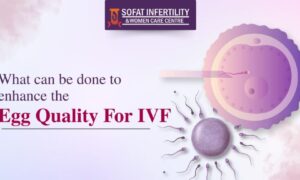Infertility is a deeply personal journey that affects millions of couples worldwide, often leading to emotional, financial, and physical challenges. As advancements in medical science continue to evolve, a new era of infertility treatments emerges, offering renewed hope for those struggling to conceive. From cutting-edge assisted reproductive technologies (ART) to innovative hormonal therapies, the landscape of infertility management is rapidly transforming, with numerous options tailored to meet the unique needs of patients. In recent years, research has unveiled promising techniques such as preimplantation genetic testing, fertility preservation methods, and advances in in vitro fertilization (IVF) that enhance the likelihood of successful pregnancies. Moreover, integrative approaches that consider both physical and emotional well-being are gaining traction, providing couples with holistic support on their journey. This article delves into the latest developments in infertility treatments, exploring how these breakthroughs are reshaping the experiences of couples facing fertility challenges. By highlighting success stories, expert insights, and emerging therapies, we aim to equip readers with comprehensive knowledge, empowering them to make informed decisions and instilling hope for a brighter future in their pursuit of parenthood.
Advances in IVF Techniques and Success
Recent advancements in in vitro fertilization (IVF) techniques have significantly improved success rates and offered new hope to couples facing infertility challenges. Innovations such as preimplantation genetic testing (PGT) allow for the assessment of embryos for genetic abnormalities before implantation, thereby increasing the likelihood of a successful pregnancy and reducing the chances of miscarriage. Additionally, the refinement of laboratory techniques, including the use of time-lapse imaging and improved culture media, has enhanced embryo selection processes, leading to better outcomes.
Moreover, the introduction of artificial intelligence in embryo evaluation is revolutionizing the way fertility specialists make decisions regarding embryo viability. AI algorithms can analyze complex data from embryos and identify those with the highest potential for implantation. These advancements not only increase the efficiency of the IVF process but also provide couples with personalized treatment plans, taking into account their unique medical histories and reproductive needs. As research continues to evolve, the combination of these cutting-edge technologies holds promise for even higher success rates in IVF, offering renewed optimism for those seeking to expand their families.
Discover innovative methods enhancing IVF outcomes for hopeful parents
Discover innovative methods enhancing IVF outcomes for hopeful parents with tailored treatment plans that align with their unique biological profiles. Furthermore, the integration of personalized medicine approaches in IVF is gaining traction, allowing for customized protocols based on individual hormonal responses and reproductive histories. This personalized approach can optimize ovarian stimulation and enhance egg retrieval outcomes, thereby improving overall success rates.
The use of complementary therapies, such as acupuncture and nutritional counseling, is also being recognized for its potential benefits in conjunction with traditional IVF treatments. Studies have shown that these holistic methods can reduce stress levels and improve overall well-being, which may positively influence reproductive function. As the landscape of fertility treatments continues to evolve, these innovative strategies are paving the way for more effective and supportive IVF experiences for hopeful parents.
- What Can Be Done To Enhance The Egg Quality For IVF?
- Understanding the Differences Between IUI and IVF Procedure to Treat Infertility
Emerging Hormonal Therapies for Fertility
Recent advancements in hormonal therapies are revolutionizing the approach to fertility treatment, offering new hope for couples facing challenges in conceiving. These therapies focus on optimizing endocrine functions to enhance reproductive health, particularly through the modulation of key hormones such as estrogen, progesterone, and follicle-stimulating hormone (FSH). By implementing novel hormonal regimens, clinicians are able to fine-tune ovarian response, improve egg quality, and support uterine receptivity, thereby addressing common barriers to conception.
In addition to traditional hormone therapies, emerging treatments that leverage bioidentical hormones and novel delivery systems are showing promise in clinical studies. These approaches aim to reduce side effects while increasing efficacy, making them more appealing options for patients. Furthermore, ongoing research into the role of hormonal signaling pathways is shedding light on the intricate mechanisms governing reproduction, potentially leading to the development of targeted therapies that could significantly enhance fertility outcomes. As these innovative hormonal options continue to evolve, they are set to play a crucial role in improving the lives of couples striving to build their families.
Explore new hormonal treatments boosting fertility in women and men
Recent innovations in hormonal treatments for fertility are not only focusing on women but also extending their benefits to men, thereby addressing infertility from a more comprehensive perspective. In men, new therapies are being developed to enhance testosterone levels and optimize spermatogenesis, which is essential for improving sperm quality and quantity. For women, advancements include the use of tailored hormonal protocols that can mitigate conditions such as polycystic ovary syndrome (PCOS) and endometriosis, both of which can impede fertility.
Additionally, the integration of personalized medicine into fertility treatments is becoming increasingly prevalent. Tailored hormonal therapies take into account individual hormonal profiles and genetic factors, allowing for more precise and effective interventions. These personalized strategies not only aim to enhance overall reproductive health but also strive to minimize the potential side effects often associated with hormonal treatments, fostering a more supportive experience for couples navigating their fertility journeys. As ongoing research continues to uncover the complexities of reproductive endocrinology, the future of hormonal treatments appears promising, poised to deliver more effective solutions for those seeking to conceive.
Genetic Testing Enhancing Treatment Options
Genetic testing is playing an increasingly pivotal role in enhancing treatment options for couples facing infertility, providing critical insights that inform tailored therapeutic strategies. By analyzing genetic profiles, healthcare providers can identify inherited conditions that may impact fertility, such as chromosomal abnormalities or gene mutations linked to reproductive disorders. This information enables couples to make informed decisions regarding their treatment paths, including the possibility of utilizing techniques like preimplantation genetic testing (PGT) during in vitro fertilization (IVF). PGT allows for the selection of genetically healthy embryos, thereby increasing the likelihood of successful implantation and reducing the risk of genetic disorders in offspring.
Moreover, genetic testing can reveal potential responses to various fertility medications, leading to more individualized treatment plans that maximize the chances of conception. For example, insights gained from pharmacogenomic testing can help tailor hormonal therapies based on how an individual’s body metabolizes certain medications. This not only enhances treatment efficacy but also minimizes the risk of adverse effects. As the understanding of the genetic underpinnings of infertility continues to evolve, incorporating genetic testing into treatment protocols stands to dramatically improve outcomes for couples navigating the complexities of infertility.
Learn how genetic testing improves personalized infertility treatment plans for couples
Furthermore, by understanding each partner’s genetic makeup, clinicians can better predict how individuals may respond to specific fertility treatments, such as hormonal therapies or assisted reproductive technologies. This allows for the customization of medication protocols that align with a couple’s unique biological profiles, enhancing the efficacy of treatments and minimizing potential side effects. Additionally, insights gained from genetic testing can assist in identifying underlying health issues that may not be immediately apparent, allowing for comprehensive management of any coexisting conditions that could hinder fertility.
As a result, the integration of genetic testing into infertility treatment plans not only fosters a more personalized approach but also empowers couples with knowledge that may shape their reproductive journey. By addressing both genetic factors and individual health histories, healthcare providers can formulate strategies that optimize chances of conception, ultimately supporting couples in achieving their desired family goals.
In conclusion, the landscape of infertility treatments continues to evolve, offering renewed hope for couples navigating the challenges of conception. Advances in technology, personalized medicine, and a deeper understanding of reproductive health are paving the way for innovative approaches that enhance success rates and improve patient experiences. While the journey may still be fraught with emotional and physical hurdles, the growing array of treatment options provides optimism for many aspiring parents. As research progresses and new therapies emerge, it is crucial for couples to stay informed and consult with fertility specialists to find the best path forward tailored to their unique circumstances. Ultimately, the commitment to exploring these advancements reflects a significant step toward achieving the dream of parenthood.































